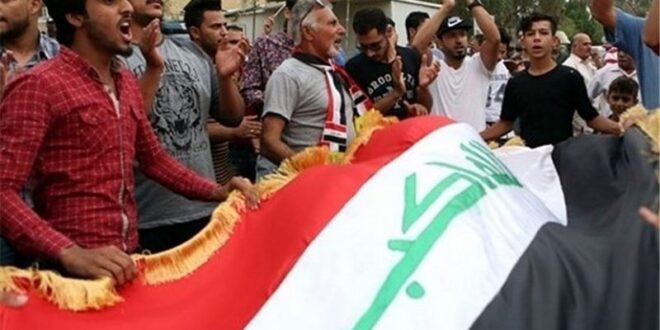In a recent speech, Hezbollah leader Hassan Nasrallah described US President Joe Biden’s decision to pull troops out of Afghanistan as an American defeat. “All eyes have turned toward the US occupations in Iraq and Syria,” he added.
America’s military indecisiveness in Syria, mismanagement in Iraq and its many recurrent mistakes have empowered Iran and its militias to take advantage of the superpower’s failings and promote their hostile rhetoric. Although Iran and its militias have no development project or the ability to build a modern state or a democratic regime, they have benefited due to American mistakes.
Such sentiments have not been reiterated by Hezbollah alone. The rest of Iran’s allies have also been propagating this narrative.
The Palestinian Hamas movement issued a statement saying: “The end of the occupation of the US and its allies (in Afghanistan) proves that the resistance of peoples, especially the Palestinian people, is destined for victory and for achieving the goals of freedom and return.”
Adnan Al-Dulaimi — the head of Iraq’s Al-Sadiqun parliamentary bloc, which represents the Asa’ib Ahl Al-Haq organization led by Iranian ally Qais Khazali — believes the recent developments in Afghanistan “are proof of what we have always said and continue to say: That the Americans cannot be trusted.”
Iraq’s pro-Iran armed militias have supported the “path of the resistance” on their Telegram accounts. The Ashab Al-Kahf group published a video of an attack targeting a military convoy that it claimed belonged to US forces. Anti-US rhetoric can also be found on several other Telegram channels, including Al-Jibha Al-Electronia, Ansar Kata’ib Hezbollah and Dhu Al-Faqar Al-Kata’ib, which are all pro-Iran media outlets advocating violence as an effective tool for getting foreign forces out of Iraq.
The Taliban’s rise to power in Afghanistan will lead to stronger rhetoric among the armed militias in Iraq and will probably lead them to intensify their military operations, including firing Katyusha rockets on the Green Zone in Baghdad and using drones to attack targets in Iraq and the Arabian Gulf.
The euphoria of the anti-US forces in the Middle East will lead to greater coordination and fewer Iranian concessions in Iraq, Syria, Yemen and Lebanon, especially with the election of Ebrahim Raisi, the new conservative Iranian president, which portends an increase in the Islamic Revolutionary Guard Corps’ activities.
All of this will increase pressure on the government of Iraqi Prime Minister Mustafa Al-Kadhimi, who is seeking to hold a summit with the leaders of Iraq’s neighbors by the end of August. Al-Kadhimi wants to create common ground for understanding among these countries and to reconcile adversaries, starting with issues on which they can reach an understanding, such as the economy and anti-terror efforts.
The US must address the adverse impact of its chaotic withdrawal from Afghanistan if it wants the Middle East to be a safer region. Washington must offer greater deterrents against terrorist attacks on its soldiers in Iraq, support Al-Kadhimi’s government on the financial and intelligence levels, and continue to train the Iraqi army and riot police. It should also build relationships with the Iraqi state institutions, not only with politicians.
Simultaneously, it should support Al-Kadhimi’s steps in fighting corruption, as illicit enrichment in Afghanistan and the money going to Afghan warlords deferred development there and led to high poverty and unemployment rates. These are already a recurrent problem in Iraq, which suffers deep structural economic problems despite its oil wealth.
In parallel, the US should support friendly governments in the Gulf, particularly by reinforcing their modernization and reform plans. It should also coordinate with them in fighting terrorism and should understand their concerns about Iranian threats. Washington must denounce any bad individual deal with Iran that does not take into consideration security in the Gulf and other neighboring states that want to have good relations with the Iranian regime and seek to have real understandings with it, rather than temporary negotiations that do not achieve permanent peace.
As for Yemen, the US should carefully monitor what is happening in the country. The Houthis do not pose the only threat, as Al-Qaeda is also based there. Radical groups will become active and, unless there is real pressure that pushes the Houthis into joining the political process and accepting a peaceful solution, there will not only be a threat to Yemen’s neighbors, but it will also become a site for extremists who emerge there and target US and Western interests around the world. Therefore, Washington should create a real and efficient safety net in partnership with friends and allies.
 Eurasia Press & News
Eurasia Press & News



